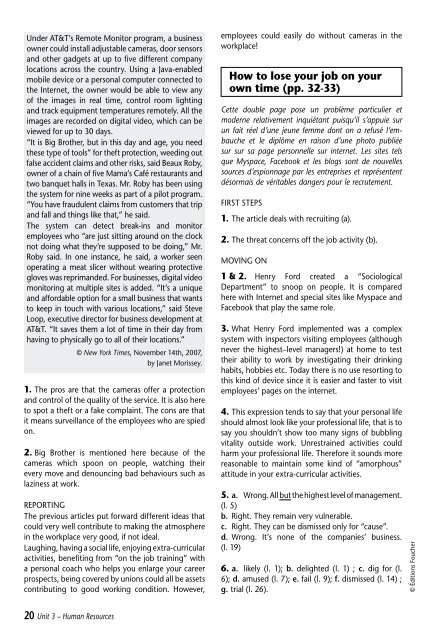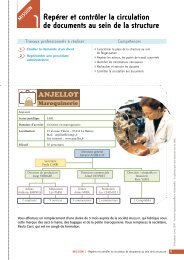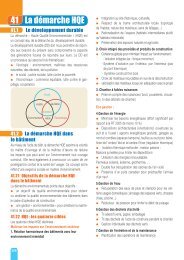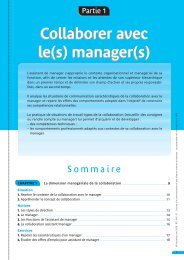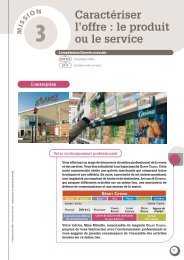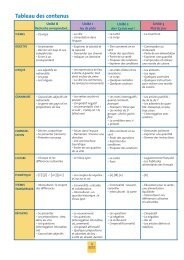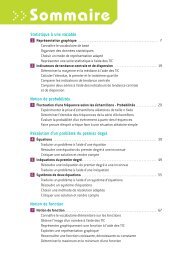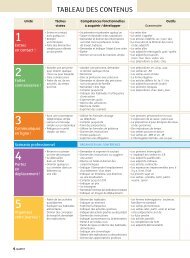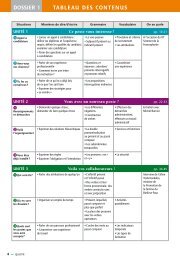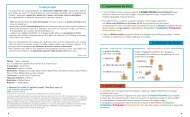GUIDE PÉDAGOGIQUE - Hachette
GUIDE PÉDAGOGIQUE - Hachette
GUIDE PÉDAGOGIQUE - Hachette
Create successful ePaper yourself
Turn your PDF publications into a flip-book with our unique Google optimized e-Paper software.
Under AT&T’s Remote Monitor program, a business<br />
owner could install adjustable cameras, door sensors<br />
and other gadgets at up to five different company<br />
locations across the country. Using a Java-enabled<br />
mobile device or a personal computer connected to<br />
the Internet, the owner would be able to view any<br />
of the images in real time, control room lighting<br />
and track equipment temperatures remotely. All the<br />
images are recorded on digital video, which can be<br />
viewed for up to 30 days.<br />
“It is Big Brother, but in this day and age, you need<br />
these type of tools” for theft protection, weeding out<br />
false accident claims and other risks, said Beaux Roby,<br />
owner of a chain of five Mama’s Café restaurants and<br />
two banquet halls in Texas. Mr. Roby has been using<br />
the system for nine weeks as part of a pilot program.<br />
“You have fraudulent claims from customers that trip<br />
and fall and things like that,” he said.<br />
The system can detect break-ins and monitor<br />
employees who “are just sitting around on the clock<br />
not doing what they’re supposed to be doing,” Mr.<br />
Roby said. In one instance, he said, a worker seen<br />
operating a meat slicer without wearing protective<br />
gloves was reprimanded. For businesses, digital video<br />
monitoring at multiple sites is added. “It’s a unique<br />
and affordable option for a small business that wants<br />
to keep in touch with various locations,” said Steve<br />
Loop, executive director for business development at<br />
AT&T. “It saves them a lot of time in their day from<br />
having to physically go to all of their locations.”<br />
© New York Times, November 14th, 2007,<br />
by Janet Morissey.<br />
1. The pros are that the cameras offer a protection<br />
and control of the quality of the service. It is also here<br />
to spot a theft or a fake complaint. The cons are that<br />
it means surveillance of the employees who are spied<br />
on.<br />
2. Big Brother is mentioned here because of the<br />
cameras which spoon on people, watching their<br />
every move and denouncing bad behaviours such as<br />
laziness at work.<br />
REPORTING<br />
The previous articles put forward different ideas that<br />
could very well contribute to making the atmosphere<br />
in the workplace very good, if not ideal.<br />
Laughing, having a social life, enjoying extra-curricular<br />
activities, benefiting from “on the job training” with<br />
a personal coach who helps you enlarge your career<br />
prospects, being covered by unions could all be assets<br />
contributing to good working condition. However,<br />
20 Unit 3 – Human Resources<br />
employees could easily do without cameras in the<br />
workplace!<br />
How to lose your job on your<br />
own time (pp. 32-33)<br />
Cette double page pose un problème particulier et<br />
moderne relativement inquiétant puisqu’il s’appuie sur<br />
un fait réel d’une jeune femme dont on a refusé l’embauche<br />
et le diplôme en raison d’une photo publiée<br />
sur sur sa page personnelle sur internet. Les sites tels<br />
que Myspace, Facebook et les blogs sont de nouvelles<br />
sources d’espionnage par les entreprises et représentent<br />
désormais de véritables dangers pour le recrutement.<br />
FIRST STEPS<br />
1. The article deals with recruiting (a).<br />
2. The threat concerns off the job activity (b).<br />
MOVING ON<br />
1 & 2. Henry Ford created a “Sociological<br />
Department” to snoop on people. It is compared<br />
here with Internet and special sites like Myspace and<br />
Facebook that play the same role.<br />
3. What Henry Ford implemented was a complex<br />
system with inspectors visiting employees (although<br />
never the highest–level managers!) at home to test<br />
their ability to work by investigating their drinking<br />
habits, hobbies etc. Today there is no use resorting to<br />
this kind of device since it is easier and faster to visit<br />
employees’ pages on the internet.<br />
4. This expression tends to say that your personal life<br />
should almost look like your professional life, that is to<br />
say you shouldn’t show too many signs of bubbling<br />
vitality outside work. Unrestrained activities could<br />
harm your professional life. Therefore it sounds more<br />
reasonable to maintain some kind of “amorphous”<br />
attitude in your extra-curricular activities.<br />
5. a. Wrong. All but the highest level of management.<br />
(l. 5)<br />
b. Right. They remain very vulnerable.<br />
c. Right. They can be dismissed only for “cause”.<br />
d. Wrong. It’s none of the companies’ business.<br />
(l. 19)<br />
6. a. likely (l. 1); b. delighted (l. 1) ; c. dig for (l.<br />
6); d. amused (l. 7); e. fail (l. 9); f. dismissed (l. 14) ;<br />
g. trial (l. 26).<br />
© Éditions Foucher


